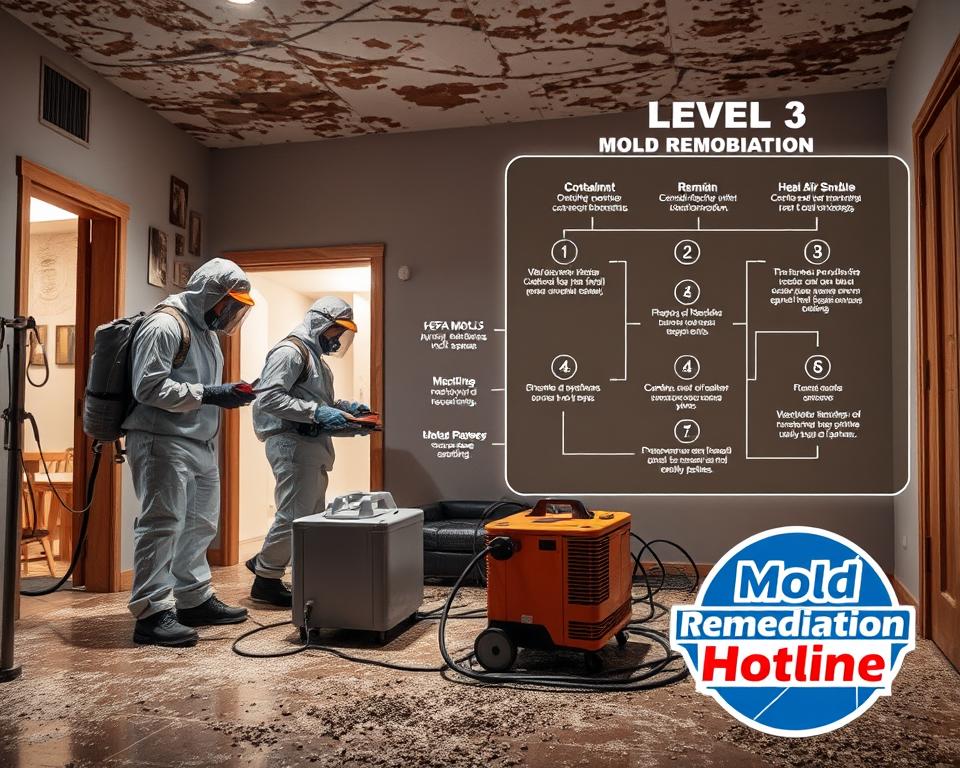Level 3 mold remediation is a big deal. It means removing mold from big areas, like 30 to 100 square feet1. Experts must work hard to make sure it’s safe.
This process is key to keeping homes safe. It’s important to get help from mold removal pros1. So, how do we make sure our homes are mold-free?
Key Takeaways
- Level 3 mold remediation involves mold growth on large surfaces, posing significant health risks1.
- Professional mold remediation services are essential for effectively addressing mold issues1.
- Maintaining humidity levels below 50% is key to stopping mold1.
- The ANSI/IICRC S520 Standard guides mold removal, following industry rules1.
- HEPA vacuums and air scrubbers help clean the air by removing mold spores1.
Understanding Mold Remediation Levels
Mold remediation is a careful process. It helps remove mold and stop it from coming back. There are 5 levels of mold remediation, based on how bad the mold is2. Knowing these levels helps pick the best mold removal services and follow the right steps.
The levels range from small areas to big mold problems in HVAC systems2. Level 3 is for mold in areas up to 100 square feet. This is a big problem. For these levels, it’s best to get help from experts.
Important things to think about include:
* Knowing how bad the mold is to figure out what to do
* Choosing the right services and following the right steps
* Keeping people safe, like babies and those who are sick
* Removing mold safely to stop it from coming back
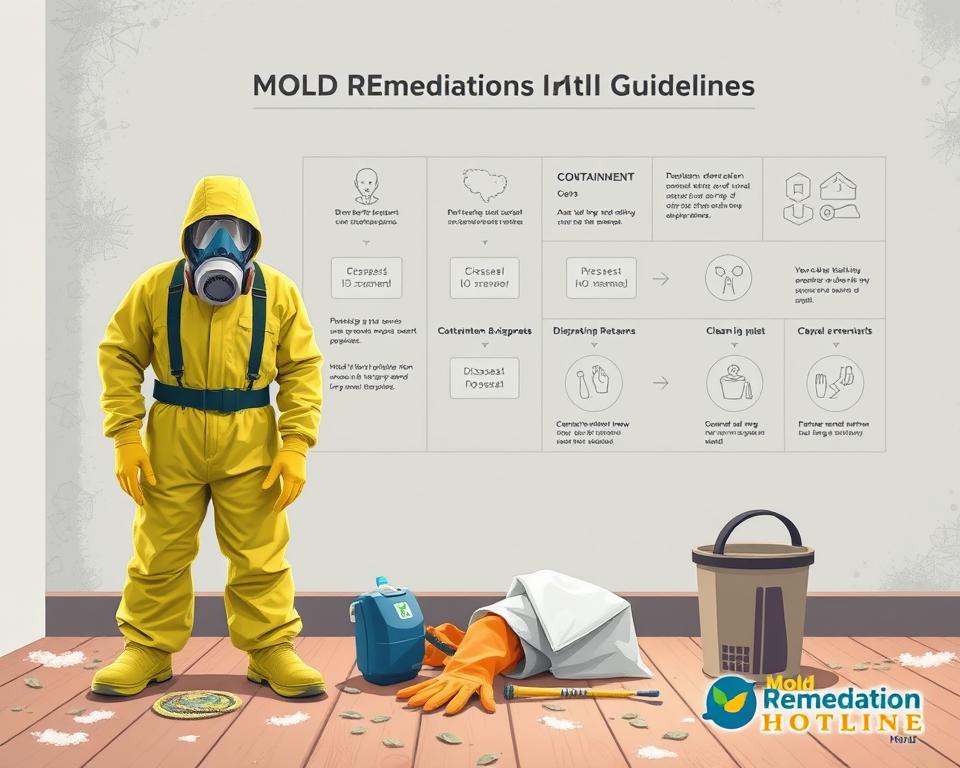
Understanding mold remediation levels helps fix mold problems at home. It’s important to work with trusted companies. This ensures a safe and healthy place to live3.
Defining Level 3 Mold Remediation
Level 3 mold remediation is a big job. It needs certified mold specialists to get rid of toxic mold and stop it from coming back. This level deals with big areas, over 30 square feet, and can be very dangerous4. The goal is to make mold levels normal, not to get rid of all of it5.
The steps for Level 3 mold remediation are detailed. They include checking, containing, cleaning, throwing away, making things clean, and giving advice to stay safe6. Finding and fixing the reason for mold is key to stop it from coming back6. Removing mold is different from fixing the problem. Remediation fixes the problem and removes mold6.
Important things for Level 3 mold remediation are:
* Need for special people and tools
* Right ventilation and keeping things separate
* Checking and finding the mold cause
* Using mold mitigation procedures to stop mold from coming back
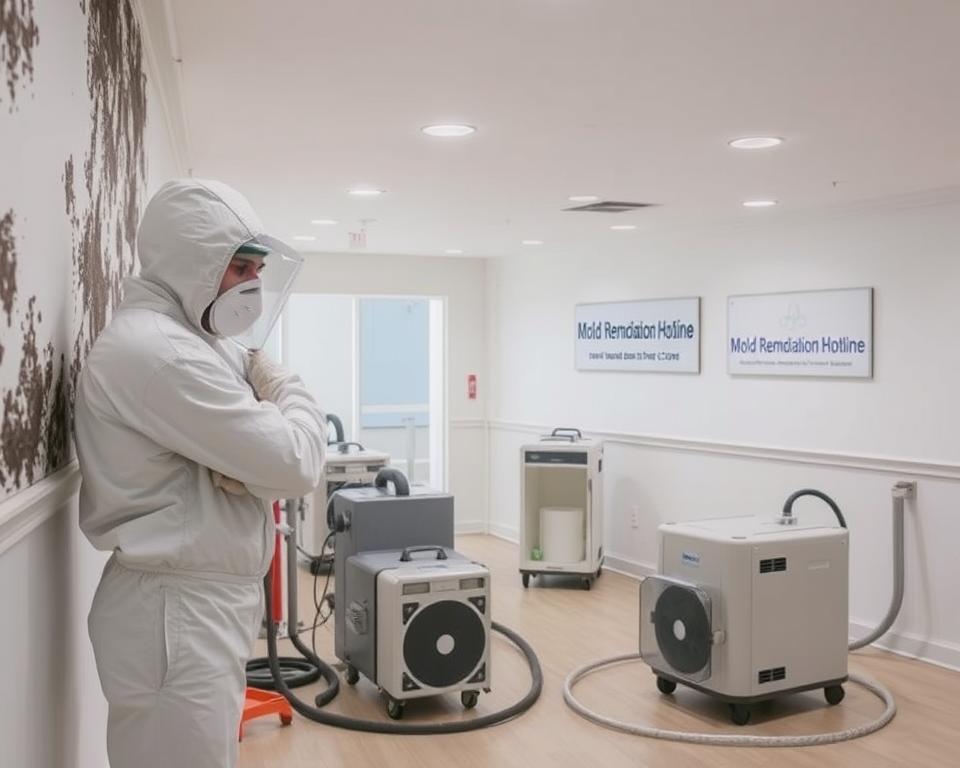
Knowing about Level 3 mold remediation helps. It shows why certified mold specialists and good toxic mold removal and mold mitigation procedures are important. Homeowners and property owners can take action to stop mold and keep it from coming back4.
| Level of Remediation | Area Affected | Health Risks |
|---|---|---|
| Level 1 | Small, isolated areas | Low |
| Level 2 | Medium-sized areas | Moderate |
| Level 3 | Large, isolated areas | High |
When is Level 3 Necessary?
Level 3 mold remediation is needed when mold is everywhere and is very harmful7. This level means mold covers big areas, from 30 to 100 square feet8. You need experts to fix it right.
Signs you need Level 3 include big mold spots, bad smells, and health issues7. High mold levels can hurt your health a lot8. Here are the main signs:
- Visible mold growth on several large surfaces
- Musty odors
- Health symptoms such as allergic reactions and respiratory problems
Fixing Level 3 mold needs a big plan. This includes stopping mold spread, cleaning the air, and removing bad stuff. It’s best to get experts to do it right and safely.
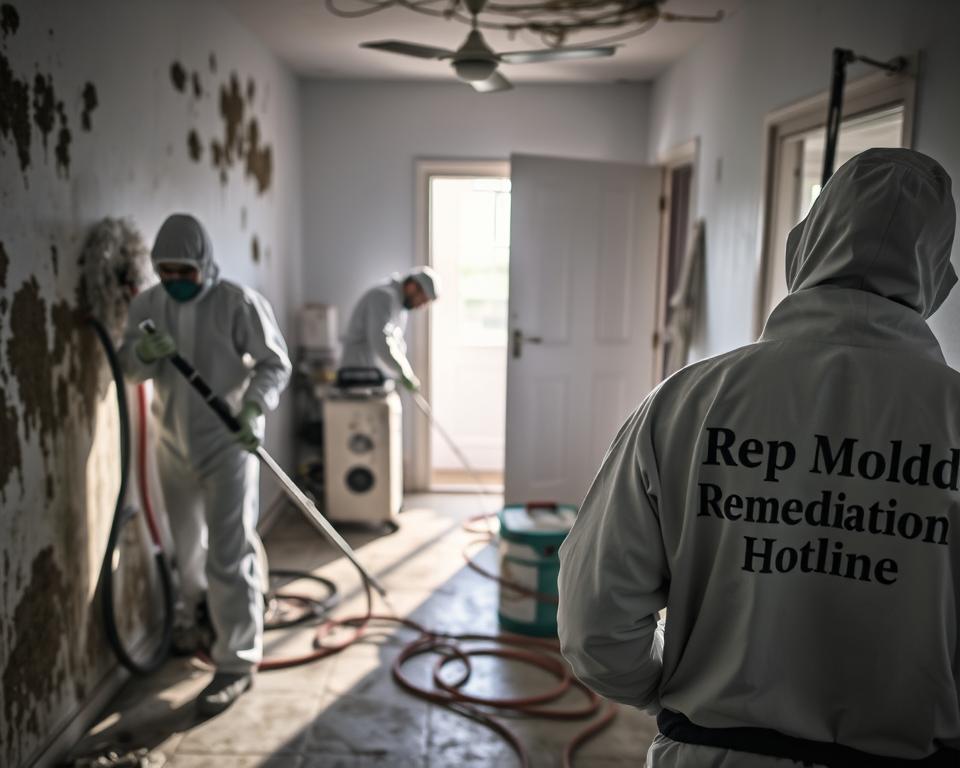
The IICRC S520 says get pros when mold is over 10 square feet7. For Level 3, it’s important to seal air ducts and make sure everyone leaves until it’s fixed7. The team will clean everything well, like vacuuming and cleaning with water7.
The Level 3 Mold Remediation Process
The Level 3 mold remediation process has many steps. It starts with checking and assessing the mold. Then, it includes making sure mold doesn’t spread, cleaning the air, and getting rid of moldy stuff9.
This process needs special tools and ways to work. The ANSI/IICRC S520 Standard says Level 3 is for big mold areas, about 30 to 100 square feet9.
First, they check how big the mold problem is. Next, they make sure mold doesn’t spread. They clean the air and throw away moldy things10.
It’s very important to follow the right steps to get rid of mold. This way, mold won’t come back.
Mold remediation companies offer services for big mold problems. They have the right skills and tools for these jobs. They make sure mold is gone for good11.
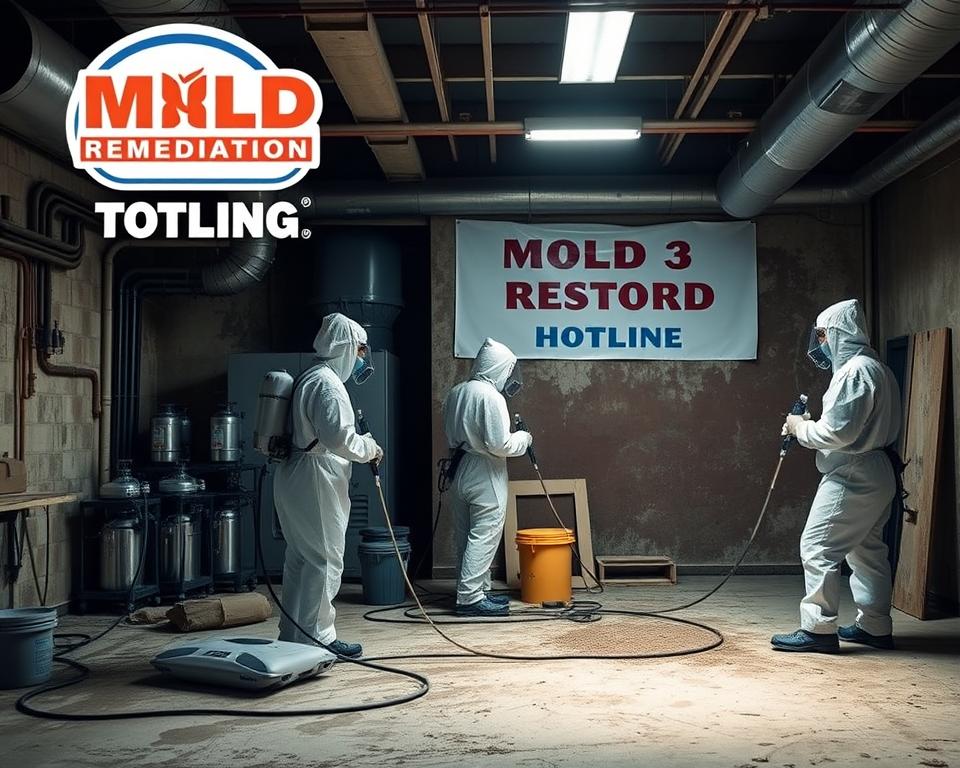
Some important steps in the Level 3 mold remediation process are:
* Checking and assessing the mold
* Making sure mold doesn’t spread
* Cleaning the air
* Getting rid of moldy things
By doing these steps and using professional mold remediation companies, you can make sure mold is gone for good.
Tools and Equipment Used in Level 3 Remediation
Level 3 mold remediation needs special tools and equipment. This ensures mold is removed well and doesn’t come back. Certified mold specialists wear PPE to stay safe from mold. They use special tools to remove moldy materials12.
They also use toxic mold removal and mold mitigation procedures13.
The tools for Level 3 remediation include air movers, dehumidifiers, and HEPA filters. These tools help control moisture and stop mold from growing14. Here are some key tools and equipment:
- Personal protective equipment (PPE), including full-face respirators and gloves
- Specialized tools for mold removal, such as wire brushes and scrubbers
- Air movers and dehumidifiers to control moisture levels
- HEPA filters to trap mold particles and other contaminants
Using these tools and equipment needs proper training and expertise. This ensures mold remediation is done safely and effectively12. The goal is to remove moldy materials, control moisture, and stop mold from coming back. This is done by following the right mold mitigation procedures and using the right equipment13.
Using the right tools and equipment in Level 3 remediation is very important. It keeps the remediation team and building occupants safe14. By following proper protocols and using specialized equipment, certified mold specialists can remove mold effectively. This is key for a healthy and safe indoor environment.
| Equipment | Description |
|---|---|
| Air Movers | Used to control moisture levels and prevent mold growth |
| Dehumidifiers | Used to control humidity levels and prevent mold growth |
| HEPA Filters | Used to trap mold particles and other contaminants |
The Role of Professional Mold Remediation Companies
When you face Level 3 mold, it’s key to get help from mold experts. They have the right tools and know-how to fix mold problems15. These pros can handle mold in areas up to 100 square feet15. They also have certified mold specialists who know how to find and fix mold issues16.
Mold removal companies do more than just clean up mold. They also clean the air and keep mold from spreading17. Getting help from experts can lower the chance of mold coming back by 70% if they fix the moisture problems17. Plus, it can save you money, up to 35%, on damage and health costs17.
Here are some good things about hiring mold removal experts:
- They can remove mold well and stop it from coming back
- They use special tools and methods
- They have certified experts who know how to find and fix mold
- It can save you money and lower the risk of mold coming back
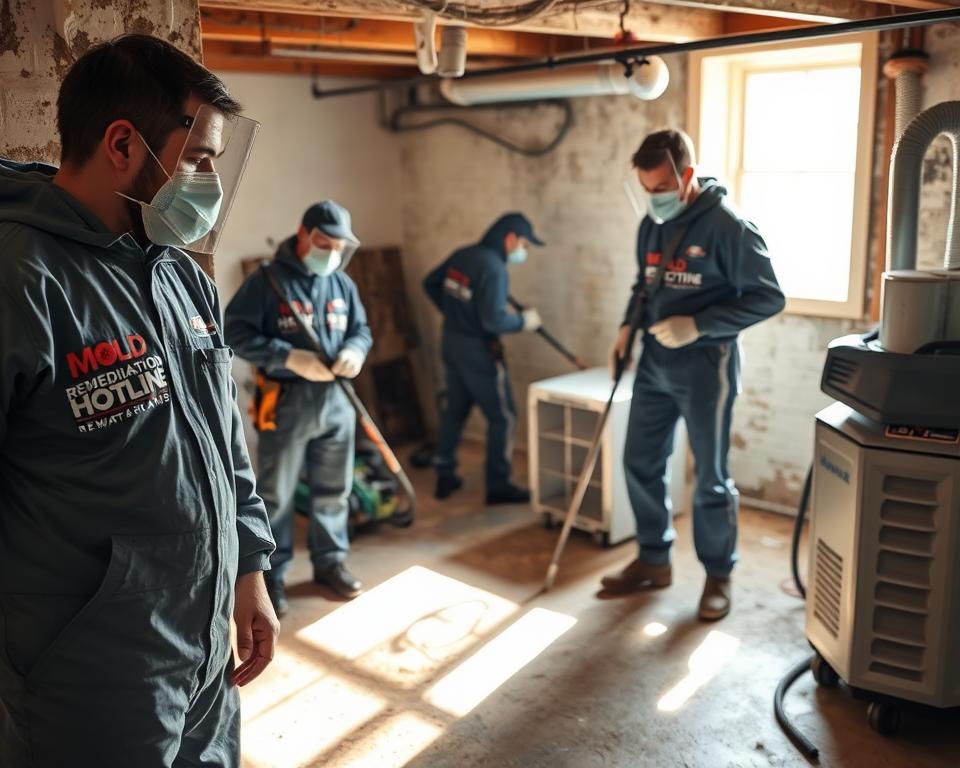
Choosing a good mold removal company means a safer, healthier home17. Make sure to pick a company with the right certifications for Level 3 mold jobs16.
Health and Safety Considerations
When we talk about mold cleanup and professional removal, health and safety are key18. It’s important to keep people safe during the cleanup to avoid health problems18. Mold can cause breathing issues and allergies18.
Mold grows because of moisture, and moisture makes mold grow on surfaces18. If you see mold, it needs to be removed right away18. Mold sampling is only needed when it’s not clear if there’s mold or not18.
When fixing mold damage, keeping people safe is a top priority. This helps avoid long-term health problems.
Some important steps for staying safe during mold cleanup include:
- Keeping people away from mold during cleanup
- Stopping long-term health issues from mold
- Wearing safety gear like goggles and gloves
- Having good air flow and filters during cleanup
By following these steps and hiring a pro, everyone can stay safe and healthy during mold cleanup19.
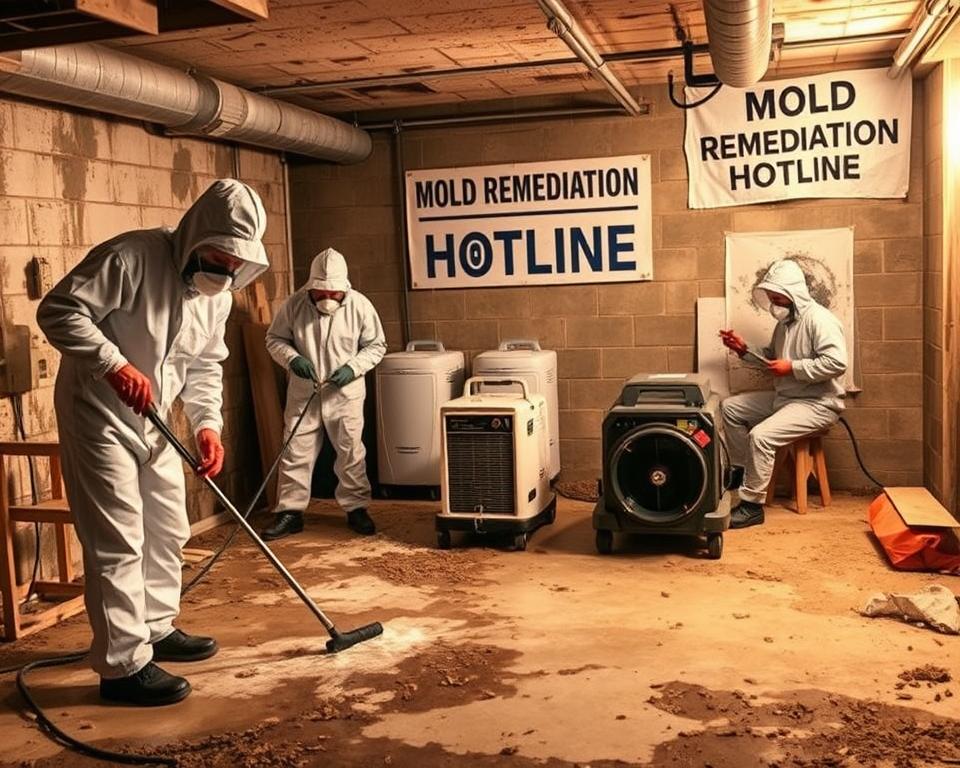
Legal and Insurance Aspects of Mold Remediation
When dealing with mold, it’s key to think about the legal and insurance sides. Owners must keep their places safe and mold-free. Mold can come back fast if moisture stays and isn’t fixed20.
Some insurance in the U.S. covers mold removal costs. Up to 50% of homeowners get help, if they act early20. But, mold can lower property value by 20%. This affects the real estate market a lot20.
It’s important for owners to know their duties and the risks of ignoring mold. Companies that deal with mold can help a lot with these tough issues.
| Insurance Coverage | Percentage of Homeowners |
|---|---|
| Mold Remediation Costs | Up to 50% |
| Property Value Reduction | Up to 20% |
Knowing the legal and insurance sides of mold helps owners protect themselves and their homes. They should follow mold removal rules, get help from experts, and work with good mold companies20.
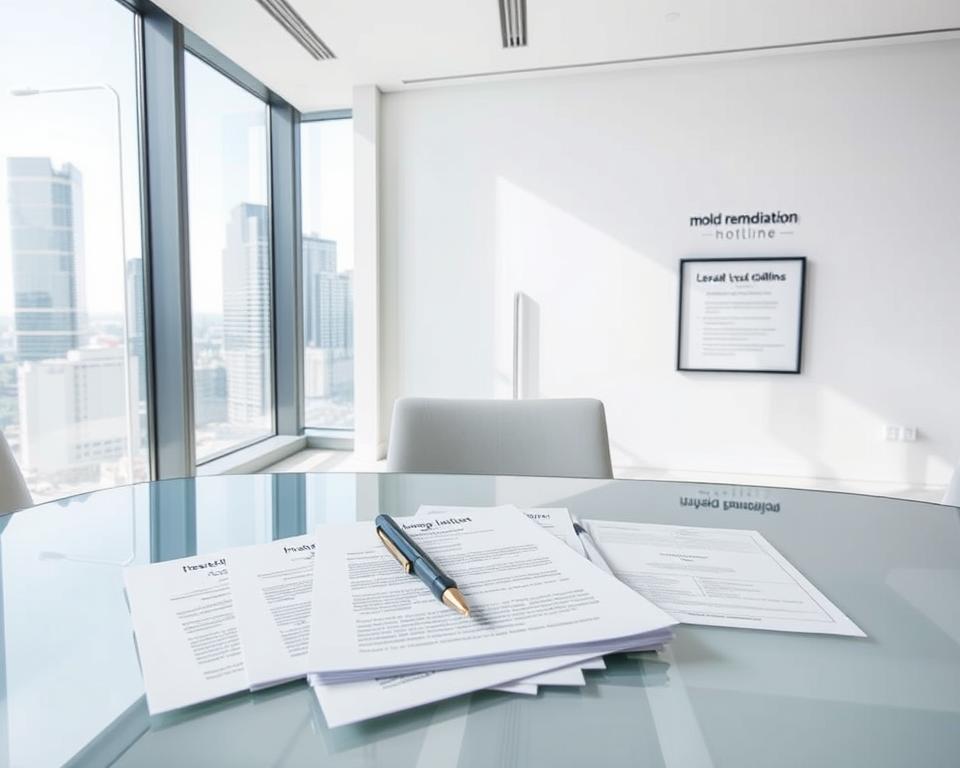
The Cost of Level 3 Mold Remediation
The cost of fixing mold at Level 3 can change a lot. It depends on how bad the mold is and where the house is21. Usually, it costs between $500 and $5,000 or more. This depends on how hard it is to fix21.
Things that affect the cost include the mold type, how big the mold area is, and what tools and people are needed22. For small mold problems (≤ 10 square feet), it might cost $150 to $30022. For a big house (10 to 100 square feet of mold), it could be $1,000 to $5,00022.
A good mold removal company will tell you how much it will cost. They will include the cost of fixing any damage21. It’s important to choose a trusted and skilled company for a safe and complete fix.
| Location | Estimated Remediation Cost |
|---|---|
| Attic | $1,000 to $4,000 |
| Basement | $500 to $3,000 |
| Bathroom | $500 to $1,000 |
Preventing Future Mold Growth
Stopping mold growth is key to a safe home. Mold can start in 24-48 hours after water hits it. A small leak can bring in up to 20 gallons of water daily, making it perfect for mold. Fixing leaks and better ventilation can stop mold23.
Keeping your home clean and checking it often helps too. It’s important to follow mold removal steps. If it’s bad, get help from mold experts. This way, you can keep your home safe from mold.
Here are some ways to stop mold from coming back:
- Fixing leaks and water damage fast
- Improving air flow and lowering humidity
- Checking and cleaning your home often
- Following mold removal rules
By using these tips and getting help from mold experts, you can keep your home mold-free2423.
| Moisture Control Strategies | Effectiveness |
|---|---|
| Fixing leaks and water damage | High |
| Improving ventilation and reducing humidity | High |
| Regularly inspecting and cleaning the property | Moderate |
Conclusion: The Importance of Timely Mold Remediation
Quick action is key to keeping homes safe and healthy. This article showed why professional mold removal is so important. It’s about stopping mold before it gets worse.
Ignoring mold can lead to big health problems25. These include stomach issues, breathing troubles, and brain problems26. It’s vital to act fast, as mold can spread quickly after water damage.
Getting help from certified experts is a smart move. They can stop mold from spreading and clean up the mess. This way, homes stay safe and healthy.
Preventing mold is easier than fixing it. Regular checks, quick fixes, and good insurance help a lot. The cost of fixing mold can be high, but acting fast keeps everyone safe and can even raise property value26.
By focusing on quick action, homeowners can keep their homes safe. This avoids the big problems that come with severe mold.
FAQ
What is Level 3 mold remediation?
What are the different levels of mold remediation?
When is Level 3 mold remediation necessary?
What is the Level 3 mold remediation process?
What tools and equipment are used in Level 3 remediation?
What is the role of professional mold remediation companies?
What are the health and safety considerations in Level 3 mold remediation?
What are the legal and insurance aspects of mold remediation?
How much does Level 3 mold remediation cost?
How can future mold growth be prevented?
Source Links
- https://www.lyonrestoration.com/what-is-level-3-mold-remediation/
- https://www.moldguy.ca/understanding-the-five-levels-of-mold-remediation/
- https://pksafety.com/blogs/pk-safety-blog/levels-of-mold-remediation-understanding-the-stages-of-mold-88c47d?srsltid=AfmBOoqo-RvcA703SDOCv2w97S2Z778xO90ME71HT0KhRzJ7Fgs6GQCs
- https://pksafety.com/blogs/pk-safety-blog/levels-of-mold-remediation-understanding-the-stages-of-mold-88c47d?srsltid=AfmBOoqwkH4fEXXTtY4__Oz_kEF_EoeOfiyfCyMcHCZJmLHNdXa8bMs9
- https://www.servpro.com/resources/mold-remediation/mold-removal
- https://www.ecofmr.com/articles/mold-removal-vs-mold-remediation/
- https://yourmoldsolutions.com/blog/5-levels-of-mold-remediation-how-to-deal-with-mold/
- https://pksafety.com/blogs/pk-safety-blog/levels-of-mold-remediation-understanding-the-stages-of-mold-88c47d?srsltid=AfmBOopcxL4V1y-ZkeL1UU1zbk1-a5k4K1f8J5aRz3euZPN-lgYF91we
- https://www.moldguy.ca/mold-remediation-levels/
- https://www.theductkings.com/mold-removal-services/mold-remediation-process/
- https://pksafety.com/blogs/pk-safety-blog/levels-of-mold-remediation-understanding-the-stages-of-mold-88c47d?srsltid=AfmBOoqZdPetOuiiW9d60d1hpIgLNmTloAPqnH86dv5t5LZjnlhtDeEW
- https://pksafety.com/blogs/pk-safety-blog/levels-of-mold-remediation-understanding-the-stages-of-mold-88c47d?srsltid=AfmBOoqi-xCgupwcxW1X4qB9P3uygrPkoESbwGTmSI6o1dWdHA90JoaU
- https://gocodes.com/mold-remediation-tools-equipment/?srsltid=AfmBOoo5JDlntVVIUrXJx_nqrg9sOTBcGpxKLHl7TU_FNbiJWUgLn9nD
- https://blink.ucsd.edu/safety/occupational/indoor/mold/abatement.html
- https://pksafety.com/blogs/pk-safety-blog/levels-of-mold-remediation-understanding-the-stages-of-mold-88c47d?srsltid=AfmBOoqJCWA81ugy06l_hapPQ026IwhcHH4aZ7tf0USfS7Rcf72Fn2PU
- https://ors.od.nih.gov/sr/dohs/Documents/moisture-and-mold-remediation-sop.pdf
- https://www.coit.com/blog/healthy-home/top-5-reasons-using-professional-mold-remediation-service
- https://ncceh.ca/sites/default/files/Mould_Assessment_Evidence_Review_March_2014.pdf
- https://www.hvcc.edu/ehs/health/mold-moisture-management-program.pdf
- https://greenworksllc.com/mold-remediation-guidelines/
- https://www.houselogic.com/organize-maintain/home-maintenance-tips/mold-remediation-cost/
- https://insights.workwave.com/industry/cleaning-services/mold-remediation-cost-guide/
- https://restorationmasterfinder.com/restoration/mold-levels/
- https://www.belfor.com/us/en/resources/when-is-mold-remediation-required/
- https://www.eliteremediations.com/what-is-level-3-water-contamination/
- https://alsyedconstruction.com/what-is-remediation-in-construction-in-the-usa-a-comprehensive-overview/
